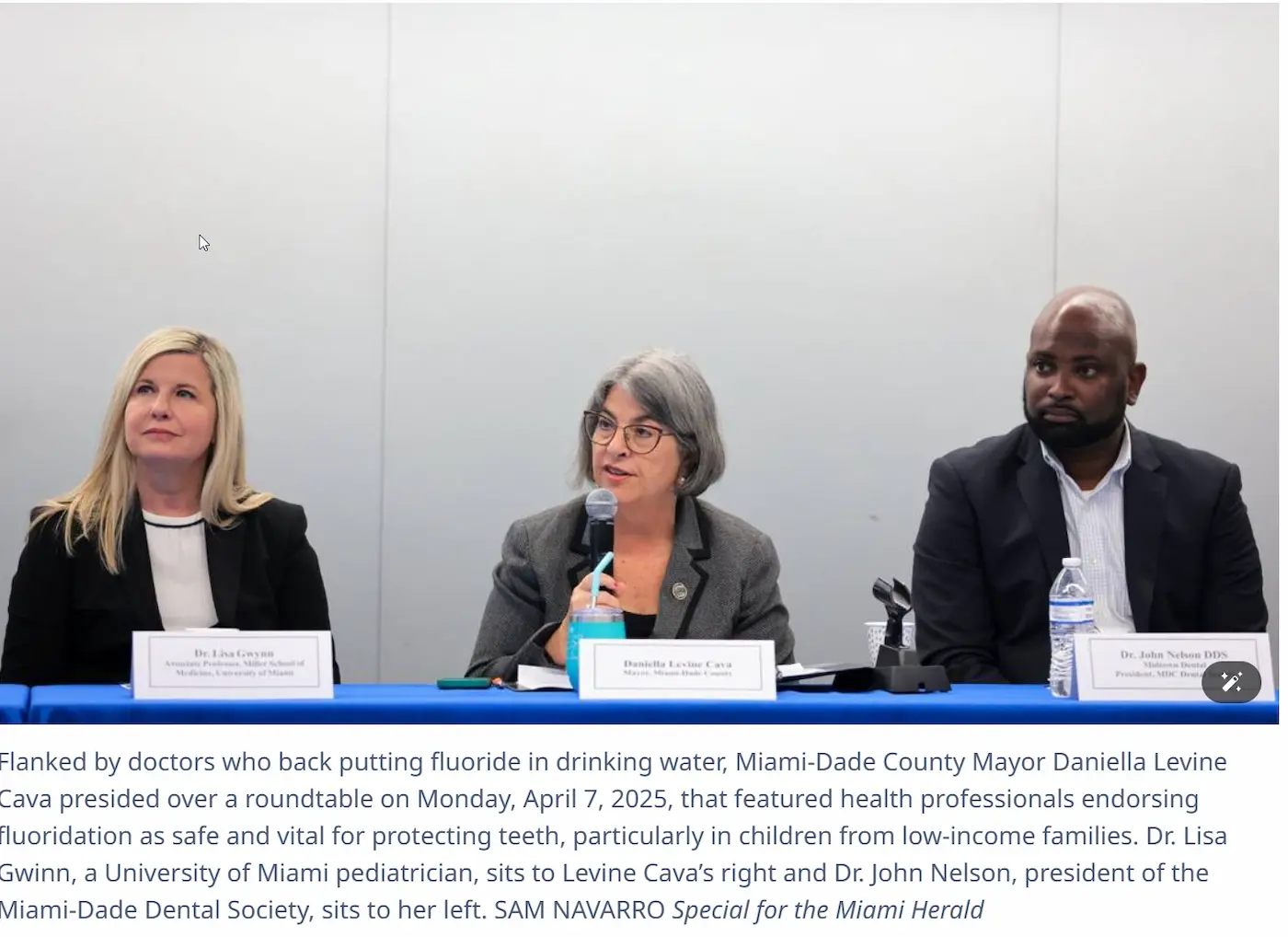|
Getting your Trinity Audio player ready... |
Tabla de Contenido/ Table of Contents
- 1 Can Public Pressure Change the Course in Miami-Dade? Debate on the Future of Fluoridated Water
- 2 Testimonies That Demand to Be Heard
- 3 Tension in the Commission: Face-Off Between Regalado and Gonzalez
- 4 The Voice of Florida’s Surgeon General: A Call for Prudence
- 5 Debate on Legislative Process and Pressure from Tallahassee
- 6 The Mayor Under Pressure: Veto or Align with the State?
- 7 A Conflict Between Science, Medical Freedom, and Government Control
- 8 A Decision That Will Set a Precedent
- 9 A Possible Change of Position?
- 10 A Decision That Will Define the Future
Can Public Pressure Change the Course in Miami-Dade? Debate on the Future of Fluoridated Water
Miami-Dade, FL – The controversy over the use of fluoride in Miami-Dade’s drinking water has escalated into a real political and social battle. As Mayor Daniella Levine Cava considers vetoing an ordinance approved by the County Commission (8 votes to 2) to stop fluoridation, citizens, health professionals, and state legislators present opposing positions on who should have the final say.
Last Monday, April 7, the mayor organized a roundtable with doctors and dentists who support the practice of adding fluoride to water, highlighting its benefits in preventing cavities, especially in low-income children.

However, that same day, citizens, activists, and parents voiced their concerns about the possible adverse effects of fluoride, demanding that their right to decide what they consume be respected.
“This is not a political issue, it’s a public health issue,” activists declared. “The latest evidence makes the decision clear: do not veto the will of the people and the commissioners.”
Testimonies That Demand to Be Heard
One of the most impactful testimonies came from Heather Berman, a Fort Lauderdale resident, who spoke directly to the commissioners:
“I suffered a neurological injury in 2017. Fluoride is a neurotoxin that is in the water and I cannot avoid. Children with autism are exposed to it every day. You committed to care for citizens, to listen to them, but you are not doing so. We want clean water, clean air, clean food. Remove the neurotoxin. You do not have the right to medicate us.”
“It’s an industrial waste”: Jill Kiley presented documents revealing that the hydrofluorosilicic acid used contains arsenic and lead.
“Forced medication”: Lissette Monson compared fluoridation to “a neighbor installing a 5G antenna without your consent.”
“Neurological damage”: Josh Jemi, during Autism Awareness Month, warned about studies linking fluoride to lower IQ.
“Thyroid diseases”: María Alexandra García shared how removing fluoride improved her Hashimoto’s.
KEY FACTS:
- 97% of Europe does not fluoridate its water.
- Utah, Ohio, and other states have already begun to phase it out.
- Excess fluoride causes dental fluorosis (stains and weakened teeth), as shown by Dr. Maya Asi with photos of an affected patient.
Commissioner Gonzalez, author of the proposal to eliminate fluoride, argued that the measure is not political or ideological, but an act of prudence:
“This is not 1945. This is not 1958. The landscape of personal health has changed. Today, fluoride is available in toothpastes, rinses, and treatments. No one is being denied access. What is not free is the right to opt out of consuming what is added to public water.”
He also noted that fluoride damages the county’s injection systems, costing $400,000 annually in maintenance, and posed the question:
“Why would we allow a chemical that is not permitted in infant formulas to be in the water used to prepare those formulas?”
Tension in the Commission: Face-Off Between Regalado and Gonzalez
During the intense session, one of the most tense moments occurred between Commissioners Raquel Regalado and Roberto Gonzalez, authors of diametrically opposed views on the process and legitimacy of the vote to eliminate fluoride in water.
Regalado openly criticized what she described as an “improvised and opaque” process, noting that crucial decisions were being made without prior public notice or sufficient committee discussion. In her remarks, she accused her colleagues of “picking winners from the dais,” referring to the process by which businesses were added to airport concessions without an open call. She emphasized that “diversity without competition is not diversity,” and that transparency should be the priority.
Gonzalez, in turn, responded firmly, defending his proposal as a public responsibility measure. He accused opponents of “clinging to past structures that no longer reflect the popular will” and emphasized it was contradictory that some commissioners who claim to distrust government now blindly trust closed administrative processes. “Who are we to decide? We are the elected representatives of three million people. Who are we not to decide?” he retorted.
The exchange revealed a deep rift not only about fluoride, but about how decisions are made in the county: whether they should be more technical and administrative, or more directly guided by the political representation of commissioners.
The Voice of Florida’s Surgeon General: A Call for Prudence
During the historic Miami-Dade County Commissioners meeting, Dr. Joseph Ladapo, Surgeon General of the State of Florida, delivered a direct and forceful message against fluoridation of drinking water. In just a few minutes, Dr. Ladapo summarized the ethical and scientific dilemma facing the county:
Dr. Joseph Ladapo, Florida Surgeon General, intervened after hours of waiting with a firm stance:
“If you as leaders decide to continue adding fluoride to the water, you must believe one of two things: either all scientific studies are wrong, or you are willing to potentially harm some people in the community, especially children and pregnant women.”
Ladapo emphasized that his position is not based on ideology but on the principle of medical prudence and the growing body of evidence about fluoride’s neurological risks. He noted that the existence of serious, peer-reviewed studies compels public officials to make informed and responsible decisions, especially when it concerns vulnerable populations.
“I don’t believe all the science is wrong. That’s why I’m here, and that’s why I hold this position.”
His participation added institutional and scientific weight to the position of commissioners who voted to eliminate the additive, marking a key moment in a local debate that now resonates at the state and national level.
Debate on Legislative Process and Pressure from Tallahassee
During the debate, a motion was proposed to postpone the decision until the end of the legislative session in Tallahassee, where Senate Bill SB 700 is being discussed, which would prohibit local governments from regulating additives like fluoride.
Commissioner Regalado noted that Agriculture Commissioner Wilson Simpson had personally called her to ask that they wait for the state’s decision before legislating locally. She criticized that the issue had not gone through a county committee, citing a lack of balance in the debate.
In response, Gonzalez denounced an “intellectual inconsistency” from his colleagues:
“In the last two years, 154 items have been removed from committee without formal discussion. And today, when we’re talking about public health, they want to block the process. That’s intellectual inconsistency.”
The Mayor Under Pressure: Veto or Align with the State?
Mayor Levine Cava has been criticized for postponing a clear decision, indicating she is “evaluating her options” and convening public discussions. However, her argument that fluoridation is a state policy is beginning to take shape, as the state Senate prepares to vote on a bill that would prohibit local governments from removing fluoride from water.
This measure, included in a broader agricultural bill (SB 700), would legally redefine “water quality additives” and consolidate state control over practices like fluoridation, invalidating local decisions like Miami-Dade’s.
“This is not a decision we can make alone,” the mayor has hinted, as the debate escalates to legislative and social levels.
A Conflict Between Science, Medical Freedom, and Government Control
The debate has reached the heart of several fundamental tensions:
- Should collective public health be prioritized or individual consent?
- Should the state decide on municipal water?
- Can the mayor represent the will of the people in the face of a potential state override?
On one side, organizations like the American Dental Association defend fluoridation as an effective public health measure. On the other, citizens across the political spectrum question its legitimacy under the precautionary principle.
A Decision That Will Set a Precedent
The mayor has until this Friday to veto or let the ordinance approved by the Commission move forward. If she does not act, fluoride will stop being added to Miami-Dade’s drinking water in May. But with the state bill about to be voted on in the Senate, the debate could transcend county boundaries and be reopened at the state or even national level.
What is at stake is not just the quality of water, but who has the power to decide over it.
Arguments Against Fluoridation: Medical, Legal, and Citizen Support
- Official guidance from Florida Surgeon General Dr. Joseph Ladapo, recommending against fluoridating public water due to neuropsychiatric risks, especially in pregnant women and children.
🔗 Official Statement - Sworn testimonies from CDC and EPA experts, admitting the potential harm of fluoride to the human body.
🔗 Watch Testimonies - Ruling from Federal Judge Edward Chen (September 24, 2024) ordering the EPA to eliminate the unreasonable risk of fluoride, citing dangers to pregnant women, newborns, and young children.
🔗 Full Ruling - Statement from U.S. Secretary of Health and Human Services, Robert F. Kennedy Jr., who said: “The evidence against fluoride is overwhelming. It makes no sense to keep adding it to water.”
🔗 Watch Video
Proponents of eliminating fluoride appeal to the precautionary principle: if there are reasonable doubts about potential harm, authorities must act to protect the public.
A Possible Change of Position?
Although the mayor has not yet confirmed her decision, her support for fluoridation and backing from traditional medical associations suggest a tendency to maintain it. However, the level of community organization and the national attention the issue is gaining could influence her final decision.
“This is not a political issue, it’s a public health issue,” activists say. “The latest evidence makes the decision clear: do not veto the will of the people and the commissioners.”
A Decision That Will Define the Future
The fluoride-in-water debate not only divides opinions; it raises an essential question about who decides what enters citizens’ bodies. Traditional science? Elected representatives? Or the directly affected communities?
Mayor Daniella Levine Cava has the final word. But the community is already making theirs heard.
Want more post like this?
Head over to our homepage for the latest updates from South Florida and beyond:











